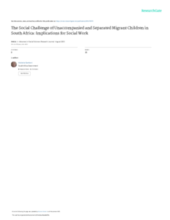This paper is based on the literature study conducted to describe and analyze the social challenge of unaccompanied and separated migrant children in South Africa and the implications for social work. South Africa is a significant destination for children who move from countries throughout Eastern and Southern Africa. The paper reveals that unaccompanied and separated migrant children (USMC) in South Africa are faced with a plethora of challenges that they begin to experience from their country of birth, during the journey to the country of destination, upon their arrival in the new country, during their stay and within the care system. It is affirmed that regardless of the setting, social workers are usually among the professionals who provide services to migrant children and their families. However, the services and support to USMC provided by social workers through their day-to-day practice are not without challenges. The challenges faced by social workers are inherently embedded in the societal dominant ideology about migrants which often influence and shape the way social workers apply the professional skills and practice when dealing with USMC. Furthermore, the environment of social work practice at USMC is multicultural and transnational by nature. The paper also reveals that social work professional knowledge and skills acquired from social work qualification are inadequate for working with migrants, particularly USMC. The paper concluded that because of migration's cultural and language diversity and complexity, cross-cultural social work is considered the most appropriate model to apply when dealing with USMC in South Africa.

